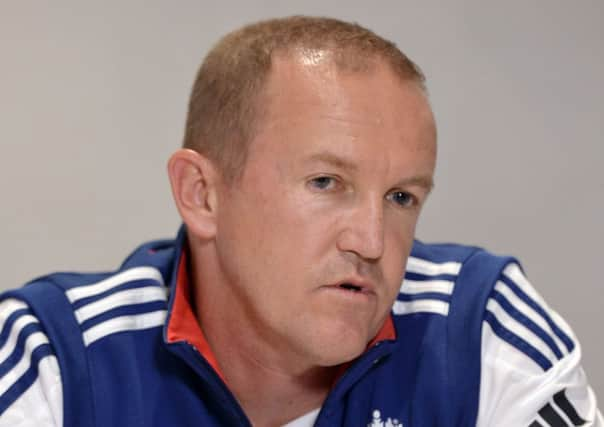Flower falls on his sword after Ashes whitewash


Flower, who oversaw an embarrassing 5-0 Ashes whitewash alongside captain Alastair Cook, became the high-profile departure much craved by public opinion after such a resounding and largely unexpected defeat.
By calling time on his own tenure, however, he has revised reassurances that he intended to embrace the challenge of reinvigorating England with Cook’s help.
Advertisement
Hide AdAdvertisement
Hide AdEarlier this month, the day after whitewash was confirmed with a 281-run defeat in Sydney, Flower stressed his appetite for the battles ahead.
Twenty-four hours later, he and the England and Wales Cricket Board issued a statement refuting reports he had presented his employers with a ‘Kevin Pietersen-or-me ultimatum’.
Flower reiterated the need then for a “calm and logical” review. It has taken another three-and-a-half weeks for him to conclude, after a meeting at Lord’s with the ECB’s new managing director Paul Downton, that he must move on – albeit potentially to a new role in the same employment.
Flower said: “Following the recent very disappointing Ashes defeat, it is clear to me this is now time for England cricket – led by Alastair Cook – to rebuild with a new set of values and goals. The opportunity to start with a clean slate and begin to instil methods to ensure England cricket is moving in the right direction will be an incredibly exciting challenge for someone. But I do not feel I am in a position to undertake that challenge.”
Flower’s endorsement of Cook is consistent with his previous remarks. It is an apparent departure, however, from policy established 14 months ago – when the ECB split Flower’s role and Ashley Giles’ as limited-overs coach – that he recommends one source of hands-on authority.
“In order for England cricket to make significant progress, I believe the team director – together with the respective captains – needs to be responsible across all formats to influence the rebuilding process,” Flower said yesterday. “This will ensure clarity and continuity.”
Flower’s five years as coach saw many high points, including three Ashes victories and a long overdue win in India.
The second Ashes success, in Australia three winters ago, was England’s first down under in almost a quarter-of-a-century.
Advertisement
Hide AdAdvertisement
Hide AdBoth Downton and ECB chairman Giles Clarke were effusive in their praise of Flower’s performance.
Downton said: “Andy has been the most successful coach in England’s history, and we at the ECB are very disappointed to see him leave the role as team director.
“We respect his decision and the reasons for it, but we are keen to keep Andy’s experience and outstanding knowledge within the ECB.”
Clarke added: “Andy Flower has not only shown himself to be a coach of great quality but also a man of great integrity. He has led England to great successes during his reign as team director.”
Flower, once the world’s number one-ranked batsman for his native Zimbabwe, formed a fruitful alliance with England captain Andrew Strauss after replacing Peter Moores as coach in early 2009.
It was one which took England to the top of the International Cricket Council world Test rankings in 2011. A year earlier, under Paul Collingwood’s captaincy, Flower’s tourists also won England’s first and as yet only global trophy – the World Twenty20 in the West Indies.
Flower admitted he leaves his role with mixed feelings.
“This has been a very difficult decision to make and I remain committed to England cricket,” he said. “I will remain in my position as a selector for the time being and am currently exploring possible roles within the ECB.”